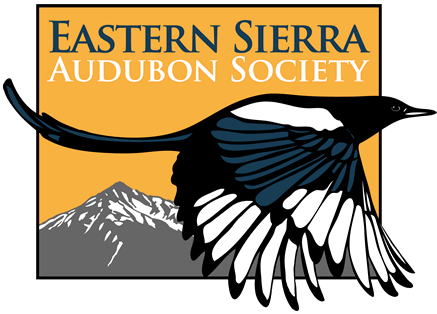Many areas can experience a fallout of birds but an area famous for it is High Island, Texas. When north moving birds meet south moving storms it’s bad for birds but exciting for birders. The following is an account of such an experience that Jim & Debby Parker, of Bishop, and we had on 30 April 1994. On our return we had many tell us of the fallout that occurred in the Owens Valley when hundreds of tanagers and flycatchers were in all the towns.
The morning temperature differed only 6°F from the previous day’s high; the morning’s humidity differed not at all. It began as another hot and humid day. The type where you think of jumping into a sauna – to dry off! The morning passed, slowly, as birders trekked the trails knowing nothing had changed. It was still muggy, mushy and miserable and almost devoid of birds. Even the ubiquitous Catbirds had the sense to flee. High, thin cirrus clouds capped the clear blue sky above the dismal marine layer that held the heat and humidity tight to the earth’s bosom. Peeks at the cirrus clouds produced prognostications of better times ahead.
At noon, when it seemed that gills would be more helpful than lungs, a gentle breeze stirred the leaves. For the first time in a week it came from the north. The temperature plummeted. Wet clothing cooled and bodies chilled. Black clouds lined the leading edge of the front. Lightening and thunder formally introduced the storm. The rains came; the games began.
Soaking wet birders stood in the rain smiling, grinning, and smirking. Parkas, raincoats, and umbrellas magically appeared. Things began slowly. Six Bay-breasted Warblers together; six feathered UFO’s fell out of the sky and disappeared into a tree beyond the trail. Chirps came from heretofore silent areas. Fingers pointed into trees, first one way, then another, and another. Excited voices started a litany of names, “Scarlet Tanager! “ “ Rose-breasted Grosbeak!” “Yellow-throated Vireo!” “Blackburnian male!” “Blue-winged Warbler!” With each shout the amoeboid crowd would ebb and flow towards the most recent find gathering into itself recently arrived birders. Then as quickly as they appeared the birds disappeared. The amoeba divided as different parts went out in search of a new feeding tree. Shortly a chorus came across the fields in soprano, baritone and base voices, “Tennessee!” “Bay-breasted!” “Parula!” “Golden-winged!” “Cerulean female (pause) and a male!” The amoeba grew again as birders converged on the new area.
The fact that it was rainy, windy, and mosquito infested bothered absolutely no one. Everything was ignored except the fallout. Soggy binoculars were dried with soggy shirts or soggy hankies or soggy scarves. Malicious mosquitoes were mashed or sprayed. The temperature continued to plunge as lightening and thunder passed over the heads of birds and birders alike. As birds who survived the arduous trip across the Gulf of Mexico hit the storm, down they dropped to join the masses below. “Chestnut-sided. Black-throated Green!” “Black-and-White!” “American Redstart!” “Yellow!” “Magnolia!” “Blackpoll!” cried the happy amoeba. While the birds feasted on mulberries and caterpillars the birders feasted on the birds.
After two hours the rain stopped, the mosquitoes disappeared, the wind ceased and the birders ran themselves ragged chasing flocks of hundreds, no, thousands of hungry birds. All the way down a row of trees they would bird just to reverse their direction and retrace their paths trying to keep up with the excited warblers, vireos, flycatchers, grosbeaks, buntings, orioles, tanagers, thrushes, and thrashers.
After another two exhilarating/exhausting hours the entire crowd looked like they could qualify for handicaped parking placards with necks, backs, and legs bent in ways for which they weren’t designed . One birder was overheard to say, “First I was praying for rain, now I’m praying for dark!”
Tags: crow, flycatcher, grosbeak, oriole, owl, thrasher, thrush, vireo, warbler
